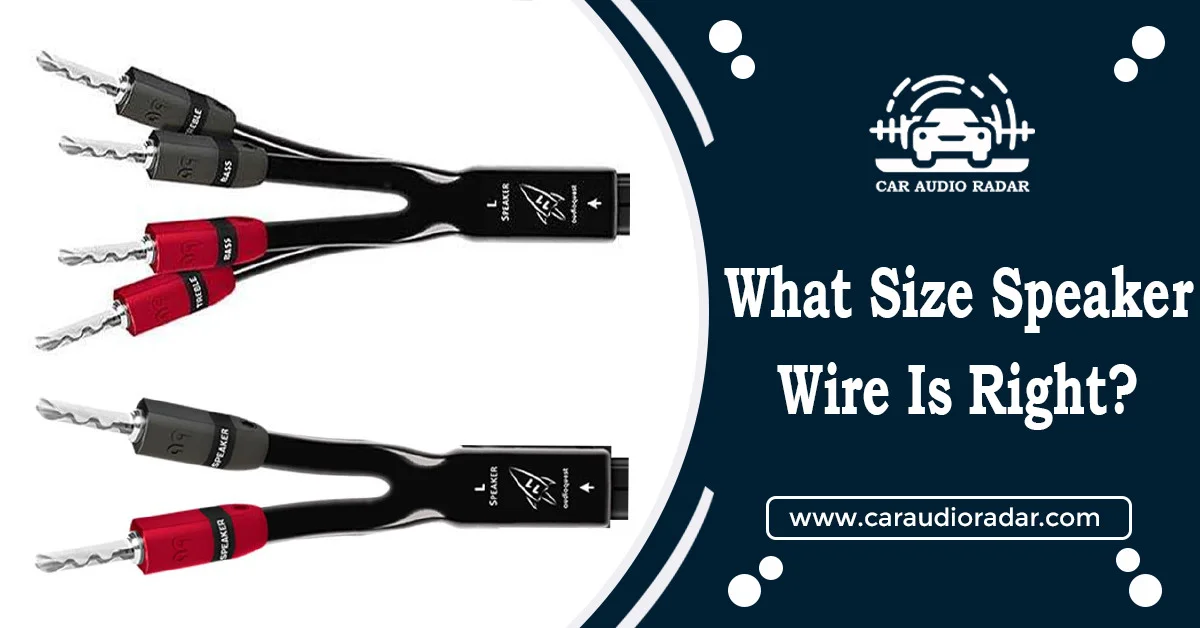Jump to
What Size Speaker Wire Is Right?: Wire Gauge
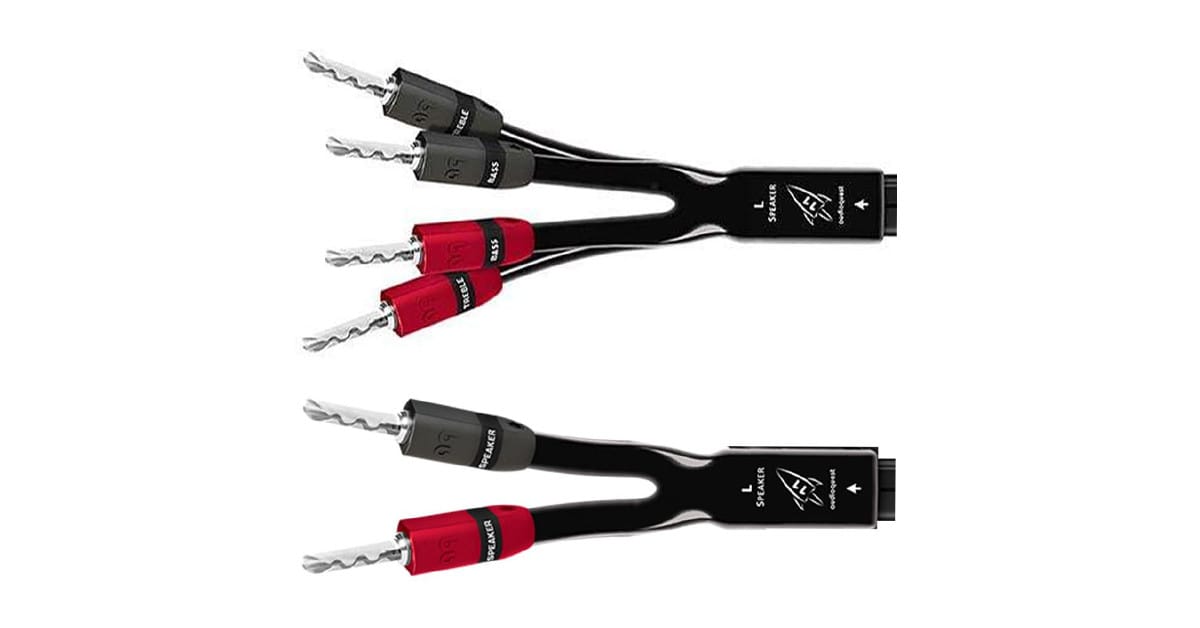
Does Speaker Wire Size Matter in Car Audio? The short answer is yes. When you’re putting together a car stereo system, people need to remember the thickness of the wires connecting the speakers. They focus more on the speakers, the main unit, and the amps. But the size of the wires matters a lot.
In this article, we’ll talk about how using different thicknesses of speaker wires affects how good your sound is, how much power your system can handle, and how well it performs overall in your car. So let’s start and find out: Do speaker wire sizes make a difference?
How Does Speaker Wires Work?
You know that speaker wires carry sound from your gadgets to your speakers. But let’s talk about how they do their job.
When you send music or voices through speaker wires, they carry a type of electricity called an analog audio signal. This electricity has the same shape as the sound waves it’s transmitting. Once it reaches the speakers, it’s turned back into sound using magnets.
Since electricity travels through these wires, how well they conduct electricity is important. Two things matter: how long the wire is and how much it resists the electric signal passing through it. Let’s focus on resistance for now.
Imagine your wires are like hoses for water. Using a tiny straw-like hose to water your plants will take forever because the water flows slowly due to high resistance. But with a broader hose, water flows freely with less resistance.
The same idea applies to speaker cables. Thin wires create more resistance for the electrical signals. This means the cables absorb much of the electrical energy, which can worsen your sound quality, especially for higher pitches.
AWG Scale
You might see speaker wires labeled with numbers 12-gauge, 14-gauge, etc. These numbers come from the American Wire Gauge (AWG) system, which measures wire thickness. The lower the number, the thicker the wire.
Now, back to our discussion about thickness. Thicker wires are more expensive because they contain more copper, the standard conductor for speaker wires.
The impedance of your speakers also matters. You’ll need thicker wires if they have lower impedance (like 4 or 6 ohms). But if they’re 8 or 16 ohms, thinner wires will do just fine.
Does The Speaker Wire Size Matter in Car Audio?
- If you’re an audiophile looking for perfection, you’ll want to match your speakers and wires precisely.
- If you’re running long cables, especially through walls, thicker wires like 12 or 14-gauge are better.
- If you have low-impedance speakers, go for broader wires.
But for most people with standard speakers and setups, using 16-gauge wires is fine. You won’t notice much difference using slightly thinner 18-gauge cables, either.
Remember: Don’t fall for fancy sales pitches from companies selling super-expensive cables. High-quality wires at reasonable prices work just as well.
Speaker Wire Sizes Explained
Speaker wires come in different sizes based on the American Wire Gauge (AWG) chart. Thicker wire has smaller gauge numbers. For example, 12AWG wire is thicker than 18AWG wire.
Speaker Wire gauge chart
|
Amperes |
Distance in feets American Wire Gauge(AWG) |
||||||
|
0-4 feet |
4-7 feet |
7-10 feet |
10-13 feet |
13-16 feet |
16-19 feet |
19-22 feet |
|
|
0-20 |
12 |
12 |
12 |
12 |
10 |
10 |
10. |
|
20-35 |
12 |
10 |
10 |
10 |
10 |
8 |
8 |
|
35-50 |
10 |
10 |
10 |
8 |
8 |
8 |
6 or 4 |
|
50-65 |
10 |
10 |
8 |
8 |
6 or 4 |
6 or 4 |
4 |
|
65-85 |
10 |
8 |
8 |
6 or 4 |
4 |
4 |
4 |
|
85-105 |
8 |
8 |
6 or 4 |
4 |
4 |
4 |
4 |
|
105-125 |
8 |
8 |
6 or 4 |
4 |
4 |
4 |
2 |
|
125-150 |
8 |
6 or 4 |
4 |
4 |
2 |
2 |
2 |
|
150-200 |
6 or 4 |
4 |
4 |
2 |
2 |
1/0 |
1/0 |
|
200-250 |
4 |
4 |
2 |
2 |
1/0 |
1/0 |
1/0 |
|
250-300 |
4 |
2 |
2 |
1/0 |
1/0 |
1/0 |
2/0 |
How Much Wire Do You Need?
Measure your distances carefully and add a little extra to be safe. It’s better to have too much wire than not enough.
Example
- Front speakers need 8 ft each (2 speakers)
- Rear speakers need 16 ft and 20 ft
- Total: 8 + 8 + 16 + 20 = 52 ft (about 15.9m)
Speaker wire is usually sold in rolls like 25ft, 50ft, and 100ft, but you can sometimes find it sold by the foot too. Occasionally, you’ll come across precut lengths like 6, 12, or 18 ft. But generally, it’s more cost-effective to buy it by the roll.
Remember this rule: never risk running out of speaker wire – buy a bit more than you think you’ll need.
Choosing the Right Speaker Wire for Long Distances
What if you need a lot of wire, like 50ft or even 100ft? In that case, a good rule is to use a wire that’s two sizes thicker than you’d normally use for shorter distances.
When we talk about wire length, we’re referring to the gauge number. As you go up or down, this number changes by two, and you won’t find odd numbers commonly used.
For example, if you normally use 18AWG wire, which is fairly thin, and you’re going to use it for a 50ft run, you might lose about 4 watts of power at max. You could choose a wire two sizes up to avoid this loss, like 16AWG or even 14AWG.
Speaker Impedance and Power
When you connect speakers to an amplifier, lower-impedance speakers draw more electrical current than higher-impedance speakers. You might need heavy gauge wire for lower-impedance speakers or longer cable runs.
Stranded vs. Solid Wire
Most speaker wires are stranded, comprising many smaller copper wires twisted together. Stranded wire is more flexible and less prone to breaking. Solid wire, on the other hand, is less flexible and can develop stress cracks over time.
Copper-Clad Aluminum vs. Copper Wire
Copper-clad aluminum wire has an aluminum core with a thin layer of copper plating. It’s cheaper than pure copper wire but has higher resistance, meaning you might need durable wire for the same performance as copper wire.
Saving Money with Smaller Wire
Since copper wire is pricey these days, and most people don’t blast their speakers at full power, here are some money-saving tips:
- If you usually don’t crank your amp or stereo past 50%-60% power, you can use a thinner wire without worrying about losing performance.
- Is extra wire lying around? You can use multiple thinner wires to create the same thickness as a tight wire. For example, you could use two pieces of 18AWG wire together to match the thickness of a single 16AWG wire.
For surround sound and center channel home theater speakers, you don’t need to splurge on the thick wire because they don’t need as much power.
Is Oxygen-Free Speaker Wire Worth It?
Nope. Don’t waste your money on oxygen-free copper wire. It won’t make any noticeable difference in sound or power. You’ll be fine if you use good-quality wire with the right thickness.
Conclusion
In the end, the size of your speaker wire does matter, but it’s just one part of the larger puzzle. Pairing the correct gauge wire with a high-quality, well-matched system will ensure you enjoy the best possible sound in your vehicle.
Careful consideration of the factors we’ve discussed and willingness to test and adjust will lead you to the optimal speaker wire solution. What Size Speaker Wire Is Right are fully explained. Hopefully now you can buy right size of wire.
Frequently Asked Questions(FAQs)
What gauge speaker wire should I use for car audio?
Choosing the right speaker wire thickness for your car audio setup depends on how much power your system puts out, the impedance (resistance) of your speakers, and how far the wire has to go.
If you have a powerful system or the wire needs to go a long way, stout wires like 10AWG or 12AWG are usually best. But for regular setups, 16 gauge or 18 gauge cables should work fine.
Does speaker wire size affect sound?
Yes, the size of the speaker wire can impact how good your sound is because of something called line loss. This happens when the wire’s resistance weakens the signal. Heavy cable with less resistance can reduce line loss, making your sound clearer and stronger when it reaches your speakers.
What happens if you use the wrong size speaker wire?
Using the wrong size speaker wire can cause problems like losing too much signal, insufficient power reaching your speakers, and the wire getting too hot. This can worsen your sound, lower the volume, and, in severe cases, even cause the wire to fail or start a fire.
What gauge wire do I need for a 1000-watt amp?
If you have a powerful 1000-watt amp and regular 4-ohm car speakers, it’s best to use a 4AWG or 6AWG wire, especially if the wire needs to go a long distance. It’s a good idea to check a wire gauge chart or talk to a professional installer to make sure you’re using the correct wire for your setup.
What size wire is best for speakers?
The proper larger wire for your car or home speakers depends on how much power the speakers can handle, their resistance, and how far they are from the amplifier. Usually, robust wires with lower gauge numbers work best for sending power well and reducing signal loss. People often use wires between 12AWG and 16AWG for most car audio system setups.
What Size Speaker Wire Is Right?: Wire Gauge
Cooper Katzeel
Cooper Katzel
Car Enthusiast
Cooper Katzel, a dedicated car enthusiast, delves into the world of automobiles and audio systems. With a deep interest in cars and a focus on superior sound, Cooper’s expertise traverses the spectrum. His journey is a delightful exploration of automotive wonders and the world of car speakers. Cooper’s passion and technical know-how make him a trusted advisor for car enthusiasts.
Follow On Instagram
Please reauthorize instagram
Recent Posts
- All Post
- Car Speaker
- Pro Tips & Guides
- Speaker Wire
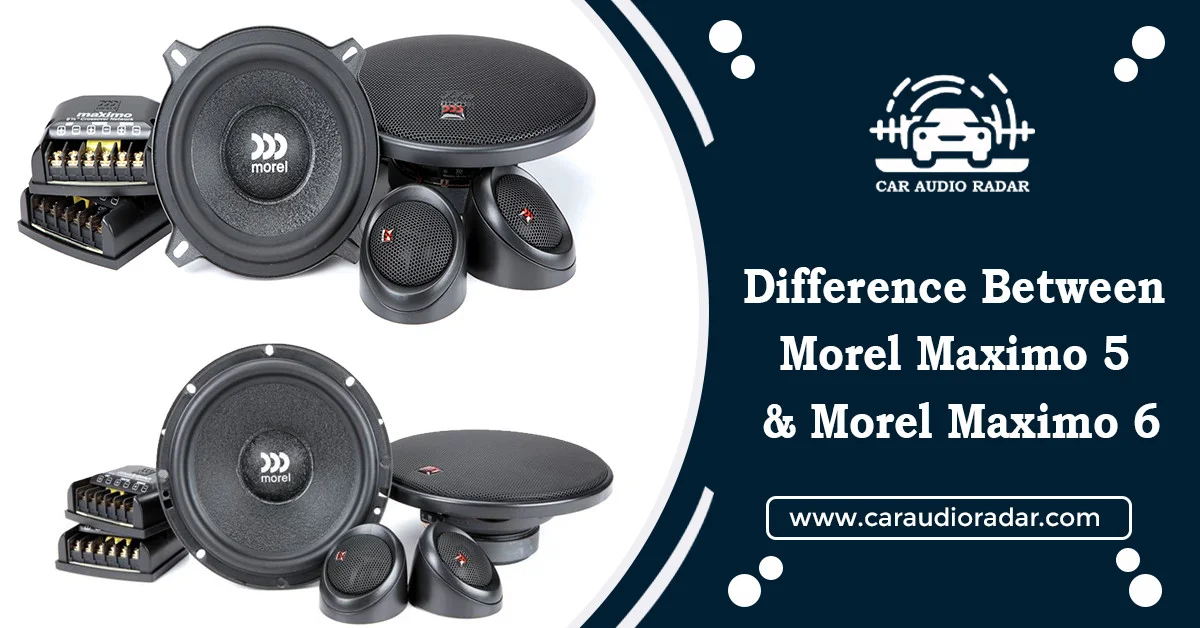
Difference Between Morel Maximo 5 and 6 for Your Car Audio
May 15, 2024
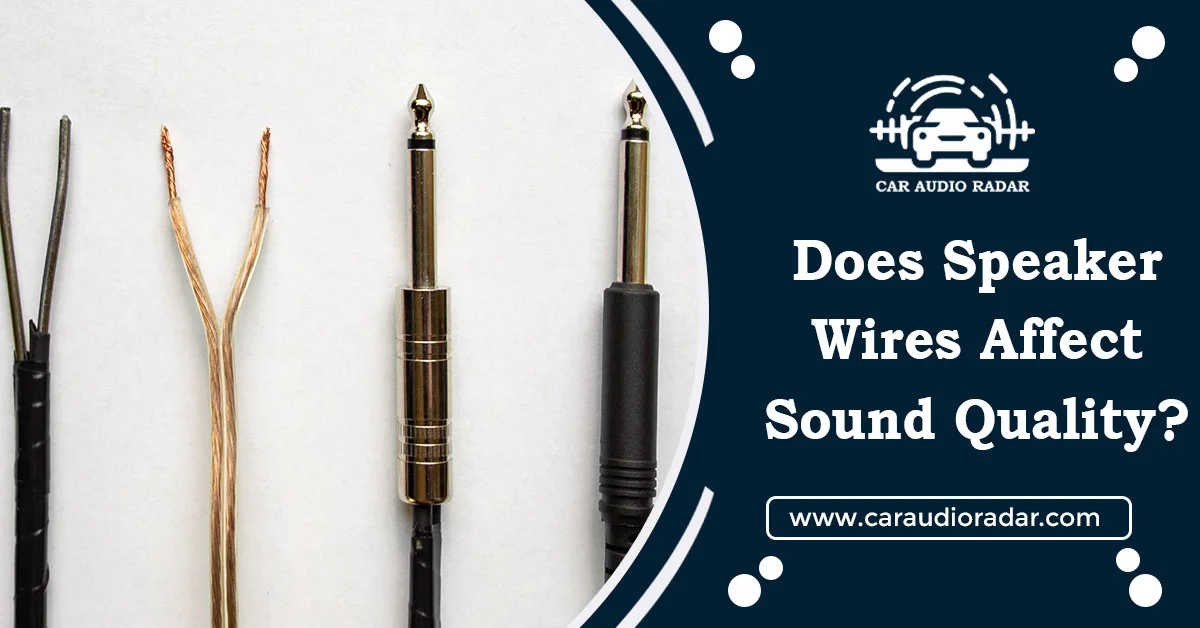
Does Speaker Wire Affect Sound Quality?: Find Out Here
May 14, 2024
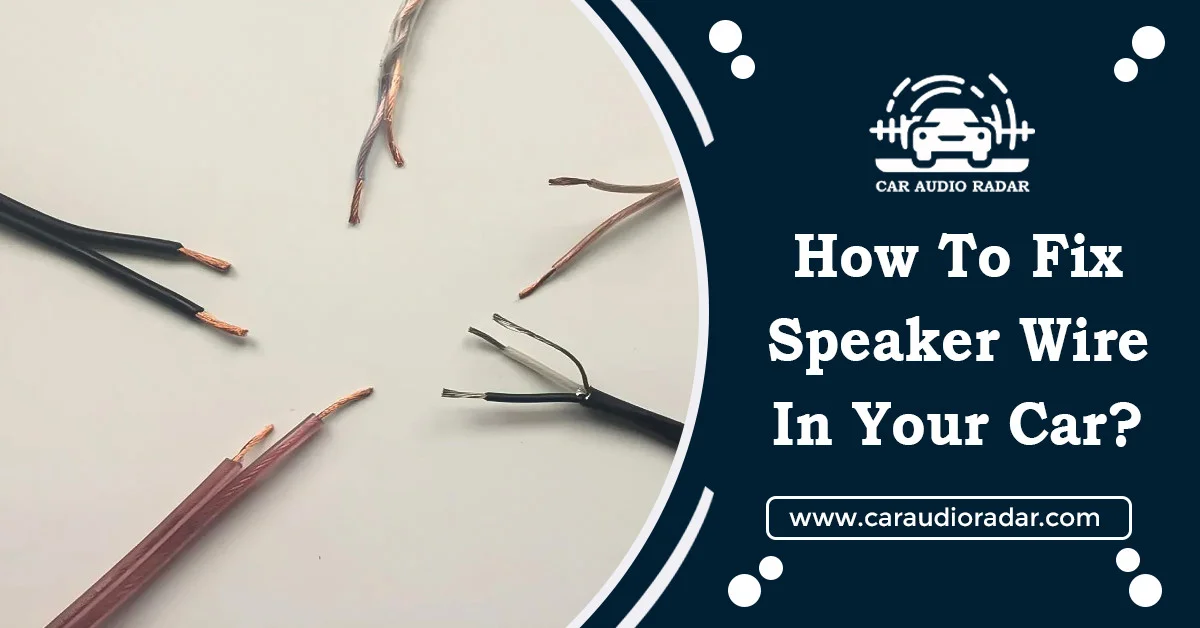
How To Fix Speaker Wire In Your Car?: Proven Methods
May 13, 2024
Dream Life in Paris
Questions explained agreeable preferred strangers too him her son. Set put shyness offices his females him distant.
Subscribe to our newsletter
Don’t miss new updates on your email
Categories
Tags
Edit Template

